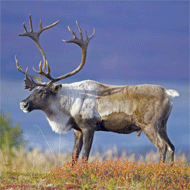Arctic reindeer decline by over 50 per cent

Five herds in the Alaska-Canada region have declined by more than 90 per cent and show no sign of recovery.
Caribou and wild reindeer herds across the Arctic tundra have declined by more than 50 per cent in the past 20 years, a new report shows.
The latest Arctic Report Card, which has been published annually since 2006, indicates that Arctic air temperatures for the past five years have exceeded all records since 1900.
Out of 22 herds monitored, only two are at historic peak numbers and have not declined. Overall, migratory herds in circa-Arctic tundra regions have fallen by 56 per cent, from 4.7 million to 2.1 million in the past two decades.
Five herds in the Alaska-Canada region have declined by more than 90 per cent and show no sign of recovery. In Russia, declines are particularly apparent in the forest, mountain and island reindeer. Out of 19 herds assessed, 18 are rare, decreasing or threatened.
Researchers say the reasons for the declines are complex, and relate to a combination of forage availability, parasites, predation, hunting and climate change, which has been identified as an overarching factor.
Other emerging issues highlighted by the report include an expansion of harmful toxic algal blooms in the Arctic Ocean and an increase in micro plastic contamination, which is threatening marine life and seabirds.
Surface air temperatures in the Arctic continued to warm at twice the rate of the rest of the globe. And in 2018, Arctic sea ice remained younger, thinner and covered less area than in the past.



 Zoetis has launched a new survey to identify management techniques for Equine Herpes Virus (EHV).
Zoetis has launched a new survey to identify management techniques for Equine Herpes Virus (EHV).